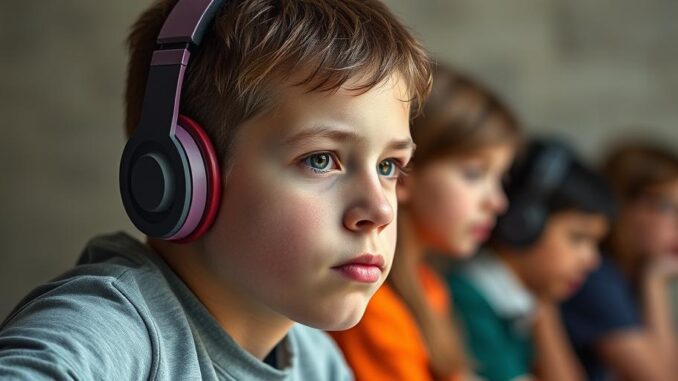
Summary
New research reveals that high school athletes with ADHD experience longer recovery times from concussions, impacting their return to both academics and sports. This highlights the need for individualized concussion management strategies, especially considering the influence of age and sex on recovery. Recognizing ADHD as a risk factor is crucial for healthcare providers in optimizing recovery plans.
Safeguard patient information with TrueNASs self-healing data technology.
** Main Story**
Okay, so, have you seen the latest research on ADHD and concussion recovery? It’s pretty interesting, especially when you consider the impact it has on young athletes. Basically, there’s a growing body of evidence suggesting that student-athletes with ADHD take longer to recover from concussions. I mean, days longer. That’s not insignificant.
One study, published in the Journal of Athletic Training, analyzed nearly 1,000 student-athletes. Kyoko Shirahata, who led the study from the University of Hawai’i at Mānoa, found that those with ADHD needed, on average, two extra days to get back to their studies and three more days before they could return to their sport. Three days! Think about the impact on training, on team dynamics, and even on college scholarship opportunities.
It makes you wonder, doesn’t it? What’s behind this delayed recovery?
Why the Delay?
Well, there are a few theories floating around. One is that the core symptoms of ADHD, like inattention and impulsivity, could make athletes more prone to head injuries in the first place. It’s not hard to imagine: someone with ADHD might be less aware of their surroundings during a game, or they might take more risks. I remember a kid I played soccer with back in high school; he was always diving headfirst, never seemed to think twice about it. You gotta wonder if that kind of impulsivity leads to more injuries.
Plus, some researchers think that the neurological differences associated with ADHD could affect how the brain responds to trauma. Maybe it just takes the brain longer to heal, or perhaps the symptoms are more pronounced because of pre-existing neurological differences. And, of course, a lot of athletes with ADHD also struggle with anxiety or depression, and that really can complicate things. Imagine trying to recover when you’re already dealing with those struggles. It’s rough.
Individualized Care is Key
All this points to one thing: we need to be way more careful in managing concussions in athletes with ADHD. A one-size-fits-all approach just won’t cut it.
Age and Sex Play a Role
And listen to this, the study also showed that age and sex matter too. Shocking, I know. Apparently, female athletes and younger athletes typically experience longer recovery times anyway, regardless of ADHD. So, a 15-year-old girl with ADHD could take considerably longer to get back on the field than an 18-year-old guy who doesn’t have ADHD. That’s a pretty big difference and it highlights the need to consider all these individual factors when you’re creating a treatment plan.
So what does this mean for everyone involved?
First off, healthcare providers, athletic trainers, and coaches need to be aware of ADHD as a risk factor. If you know an athlete has ADHD, you should keep a closer eye on them, especially after a head injury. Baseline neurocognitive testing is super important too. It gives you a benchmark to compare against after a concussion, so you can better assess the severity of the injury and track progress. But even beyond that, coaches and trainers also need to be mindful. Symptom tracking, collaborative care… it’s all part of it. A gradual return-to-learn and return-to-sport protocol is essential to minimize the risk of re-injury and long-term complications, of course. It won’t be easy.
Beyond the Sport’s Field
But it’s not just about athletes. This research has broader implications for any adolescent with ADHD. Because, after all, they’re all at a higher risk of concussion, regardless of whether they’re playing sports or not. Parents and educators need to be vigilant. If you suspect a head injury, even a minor one, don’t hesitate to get it checked out. Early identification and appropriate management are crucial, especially for those with ADHD.
Ultimately, this is a complex issue, and there’s still a lot we don’t know. Further research is definitely needed. That being said, the evidence we have now is pretty clear: student-athletes with ADHD need extra attention and support when they experience concussions. And if we can provide that, well, then hopefully, we can help them get back on their feet—and back in the game—as safely and quickly as possible.


Given the potential for impulsivity in ADHD leading to increased head injuries, how might targeted interventions, such as mindfulness training or specific safety education programs, mitigate this risk for young athletes?
That’s a great point! Mindfulness and safety education are definitely promising avenues. Perhaps incorporating these interventions into existing ADHD management plans could help young athletes develop better self-awareness and decision-making skills, ultimately reducing their risk of head injuries. Thanks for bringing this up!
Editor: MedTechNews.Uk
Thank you to our Sponsor Esdebe
Given the study’s findings on age and sex influencing recovery, how adaptable are current concussion management protocols to accommodate these varying individual profiles in young athletes with ADHD?
That’s a fantastic question! It really highlights the need for more personalized approaches. Current protocols are evolving, with increased emphasis on baseline testing and symptom monitoring tailored to the individual athlete’s profile, considering factors like age, sex and ADHD status. Let’s hope more research helps refine these strategies!
Editor: MedTechNews.Uk
Thank you to our Sponsor Esdebe